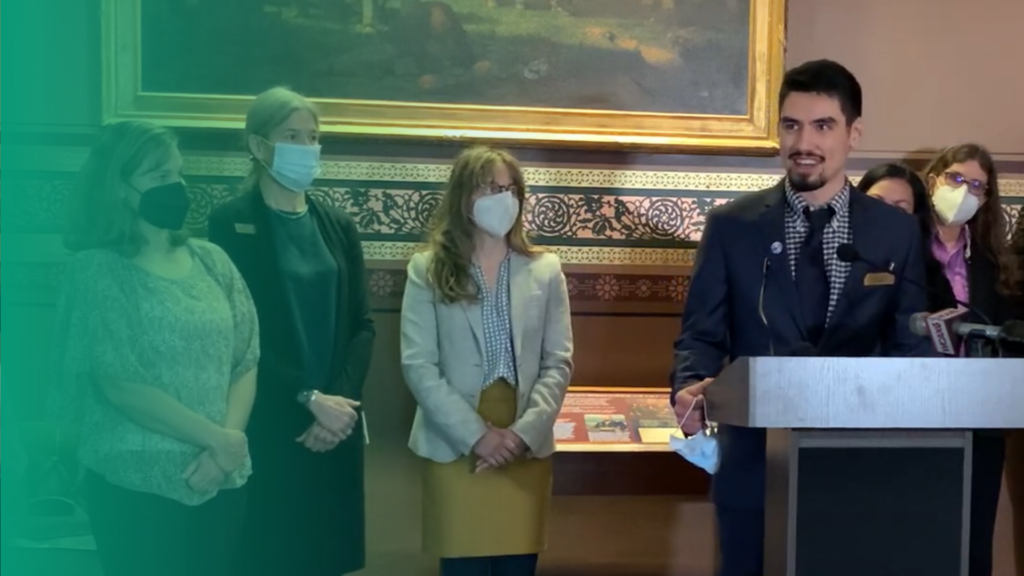Today, community leaders and legislators gathered in Montpelier to call for passage of the state’s first comprehensive Environmental Justice bill, S.148. Leaders discussed environmental justice issues in Vermont, and the actions being taken to remedy known inequities among impacted populations. Vermont is one of only a handful of states that lacks an environmental justice policy, and the passage of S.148 is a priority for environmental and social justice organizations across the state. S.148 passed the Vermont Senate earlier this year on a strong 28-1 vote, and is now being considered by the House.
“Environmental justice is a lens; it’s a way to look at ensuring no one is left behind…and a way of ensuring that resources get to those who need them most,” said Sen. Kesha Ram Hinsdale, D-Chittenden, kicking off the event and welcoming the broad coalition of environmental justice and social justice advocates. Sen. Ram Hinsdale is the lead sponsor of S.148, and first introduced a similar environmental justice framework as a senior at UVM in 2007.
Sen. Chris Bray, D-Addison, Chair of Senate Committee on Natural Resources and Energy noted, “While our hearts in our programs are in the right place, the way in which we do our work could be improved, made more inclusive, more respectful, and to learn to move at the speed of trust.”
Rep. Kevin “Coach” Christie, D-Hartford, who co-chairs the Social Equity Caucus with Sen. Ram Hinsdale and is leading environmental justice efforts on the House side added, “We’re going to be taking a very, very close look at how we can prepare Vermont to be the leader we are always expected to be.”
“Fundamentally, this bill is about improving the health and wellbeing of all Vermont residents,” added Rep. Kari Dolan, member of the House Committee on Natural Resources, Fish & Wildlife. “Through community engagement, we will be able to develop a mapping tool to help visualize environmental health issues, and target resources effectively so that no community is left behind.”
Following legislators expressing statements of support, a broad coalition of speakers joined in to voice their focus on S.148 and an environmental justice framework for Vermont, including:
“The purpose of passing Environmental Justice bill S.148 is to repair past harms and lay the groundwork for a just transition in Vermont,” stated Dan Fingas, Movement Politics Director, Rights and Democracy Vermont.“This is why we must not only ensure that the leadership of our most impacted and historically underrepresented communities is driving the vision for addressing the climate crisis, but that these leaders are adequately compensated for their time and expertise.”
“For too long, Vermonters of color and low-income Vermonters have borne a disproportionate share of environmental harms,” said Elena Mihaly, Vice President and Director of CLF Vermont. “These communities have also had the least access to the benefits of a clean, healthy environment. If we are serious about correcting these injustices, then passing S.148 is a critical step forward on that path. CLF applauds the Senate for its strong vote on S.148 and urges the House to be equally supportive.”
Sebbi Wu of the Vermont Public Interest Research Group (VPIRG) added, “Thanks to the tireless work of community leaders over several years, Vermont is on track to enact its first environmental justice law. It’s past time that Vermont joins a growing number of states with EJ legislation on the books to create a sophisticated and inclusive framework for addressing environmental justice issues across the state. This bill is a critical step toward Vermont’s continued work to address environmental disparities – whether that’s disproportionate exposure to environmental harms such as flood and climate risk, pollution, and environmental hazards, or lack of access to environmental benefits such as clean, affordable energy, heating, and transportation options, healthy food, and green spaces – that often disadvantage communities with the least means. We thank the Legislature for its work on S.148 and urge the Vermont House to pass a strong version of the bill this year.”
Neighboring states, including Maine, are exploring similar paths towards greater environmental equity. The Maine Legislature recently passed a law requiring the Governor’s Office of Policy Innovation and the Future to define ‘environmental justice’ and other related terms, and develop methods incorporating equity into decision making in state agencies.
In addition to the speakers, representatives from the legislative Social Equity Caucus and Climate Solutions Caucus, along with the Vermont Chapter of the Sierra Club, 350 Vermont, Vermont Natural Resources Council, Vermont Conservation Voters, and numerous other organizations and individuals joined the call for enacting and funding the Environmental Justice bill, S.148.

